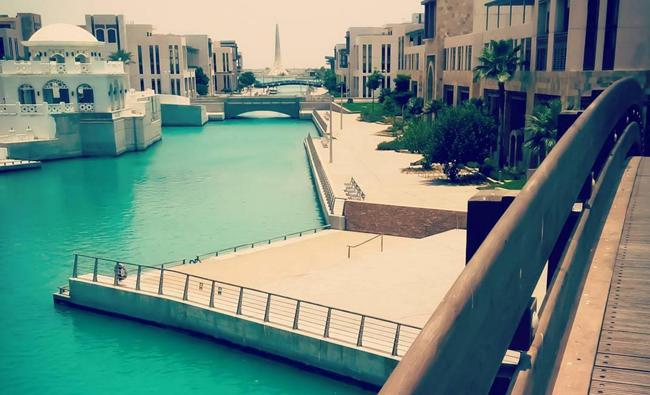
The King Abdullah University for Science and Technology (KAUST) campus in Thuwal. (KAUST photo via Instagram)
Saudi Arabia’s soft power strategy has significant potential, particularly as the Kingdom could be a key destination for those wishing to study the Arabic language, as well as for historians, archaeologists and others interested in exploring and studying the rich history of the Arabian Peninsula and the various empires, civilizations and dynasties that left their mark on the region. This is in addition to the Kingdom’s strong lure of those interested in Islamic studies and its various branches.
In universities all over the world, Arabic language and occasionally Islamic studies students often spend one or two semesters studying in an Arabic-speaking country to allow them to familiarize themselves with the subject first-hand. Countries such as Syria, Lebanon, Morocco and Egypt have previously been the favored destinations for such students, as these countries were easily accessible. Visas, for example, could be purchased on arrival at Cairo airport.
With a few minor exceptions, such as studying at the Islamic University in Madinah and at Arabic language institutes for non-native speakers, the Kingdom has, in previous decades, often been viewed as unwelcoming and closed to students and researchers alike.
However, in light of the current political situations in the aforementioned regional countries, they may now be seen as less attractive destinations for students. By contrast, the rapid pace of change, development and increasing openness at all levels in the Kingdom, along with its stable society, could make it one of the most prominent destinations and perhaps even the No. 1 choice for students and researchers wanting to come to the region to study Arabic or Islam, or even to conduct fieldwork.
In this regard, Saudi Cultural Missions worldwide must engage in a massive outreach program to introduce and promote Saudi universities and encourage Middle Eastern and Islamic studies departments at universities in the countries where they are based to communicate with their counterparts in the Kingdom to discuss opportunities for student exchange.
Saudi universities also need to promote themselves by actively participating in international academic conferences, higher education fairs, and conferences specializing in Middle Eastern, Arabic and Islamic studies so that they can reach out to the largest possible number of potential students worldwide who are interested in the aforementioned disciplines. At home, meanwhile, Saudi universities need to actively engage in creating an open and welcoming atmosphere for foreign students and researchers.
Saudi universities need to actively engage in creating an open and welcoming atmosphere for foreign students and researchers.
Dr. Mohammed Al-Sulami
Such moves would contribute substantially to the intellectual development of Saudi universities and enrich the country academically, as well as attract professors and experts in Middle Eastern and Islamic studies from around the world, and build a positive, dynamic image for Saudi Arabia.
The Kingdom should promote its unrivaled and unique status as both the cradle of Islam and the heart of the Arabian Peninsula to attract students of Arabic and Islamic studies from around the world. Where better to learn the language and the faith than in the homeland of both?
Similarly, both normal and high-end, luxury tourism, as well as historical, cultural and archaeological tours, could be promoted internationally to show the world that the Kingdom is more welcoming, varied, vibrant and steeped in history than its current misinformed profile abroad, which has stigmatized the country and turned many mindsets against it.
With so many highly qualified and talented young Saudis and so much untapped potential, Saudi Arabia could yet rival other regional hubs as a destination for study, cultural tourism and leisure.
- Dr. Mohammed Al-Sulami is Head of the International Institute for Iranian Studies (Rasanah). Twitter: @mohalsulami

